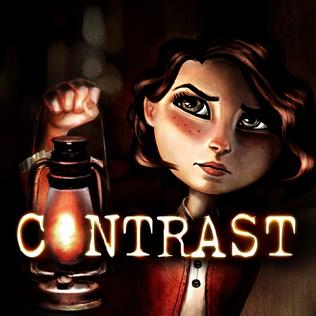Rated “T” for Teen; Reviewed on Playstation 4
You are Dawn. Tall, beautiful and dressed as a Parisian vaudevillian acrobat. You’re the mute companion of the precocious young Didi. You’re also imaginary. Or, perhaps, you’re not. Didi, of course, has a firm opinion in the matter, but as this entire experience may only exist inside her head we may not want to rely on her.
The setting is an Art Deco, Film Noir-inspired dream-world reminiscent of the 1930’s. Each of the game’s relatively small, richly detailed environments floats quietly in a starry void and crumbles away at the edges into impossible, floating architecture. You are able to, with the right light, shift in and out of shadow to progress through these environments and help Didi solve her problems.
And boy, does this kid have problems! Her mother is a cabaret singer trying to make ends meet and failing. Her father is an absent, pie-in-the-sky schemer trying to get rich quick and in bad with the wrong people. He won’t come back home until he proves that he isn’t a failure but if they can’t find some way to pay the rent there won’t be a home to come back to. Right now everything he touches is going pear-shaped.
Didi is the only character that you ever see directly; the only one that exists in your world. You hear others, and often see them as shadow puppets, but they aren’t tangible to you. Hearing a vibrant, active world while wandering through a shattered, deserted one sets a wonderfully dark, ethereal tone. The environments are spotted with short, entrancing shadow-theater vignettes that re-create the emotional highlights of the story. Each of these is an (optional) puzzle demanding that Dawn navigate through them, in shadow, to reach some distant prize.
Most of the story relates to you helping your father get his fledgling circus off the ground. You have to deliver items to convince talent to join, repair the attractions and sort out various other problems. You do this by modifying lighting conditions and phasing into shadow to reach new areas. The puzzles become slightly more complex with the addition of various props as the game progresses but never become (with the exception of some regrettable control issues) truly difficult.
The game has issues maintaining its core conceits. The architecture and outlandish set-pieces indicate that the game takes place in a dream but that minimizes the emotional impact of the story. The shadows clearly show other “real” people interacting with Didi, but at other points shadows are past events. When Dawn manipulate light and shadow is she actually manipulating the “real world”? We’re told that only Didi can see Dawn (and see that Dawn can see only Didi), yet in one of the early scenes it’s her mother, not Didi that gives Dawn (needless) direction.
It’s easy to assume that this kind of confusion may have been intentional. What, after all, are the rules in a dream? Yet as the game progresses a method to the madness is revealed that makes these tangents much less forgivable. More damning, however, were the many game-play glitches. Dawn would often get stuck in the environment or the camera would realize the most intense interest in something small and splotchy… and definitely not Dawn.
[Many of the technical issues I encountered on my play-through were recently addressed in a comprehensive patch. I suspect new players will find their adventure significantly less frustrating.]
A final, minor, criticism: the game was easy and I’m absolutely fine with that, but it also felt patronizing at times. The game’s gorgeous scenery is too-often obscured by repetitive, needless prompts and advice. The design rewards relaxed exploration but the constant reminders of your goals rush the player needlessly.
Still, for all its issues, this is one of the most interesting games that I’ve played in a long time. The story is simple and timeless. The chiaroscuro-inspired mechanics are immediately understandable, engrossing and left me wanting more. The design is beautiful. For all these reasons, I’m willing to ignore its problems and accept and recommend it as an enchanting, experimental labor of love.

